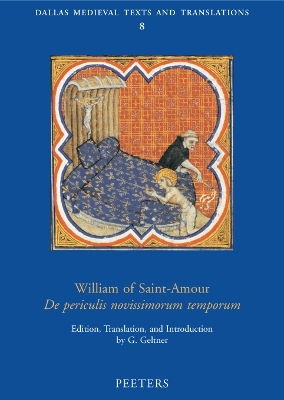Dallas Medieval Texts and Translations
1 total work
v.8
In early 1256, amidst growing tensions between Parisian secular and mendicant academies, the theologian William of Saint-Amour published his major assault on the friars, De periculis novissimorum temporum, or On the Dangers of the Last Times. As its title proclaims, the treatise employed the exegetical language of apocalypticism to expose the mendicants' success as the ultimate universal threat, and to warn their supporters that they were siding with the Antichrist. Official response to these audacious accusations did not delay. At the instigation of Louis IX of France (St. Louis) - himself an outspoken mendicant sympathizer - the pope banished William from Paris and declared his treatise unorthodox. William's party was silenced, at least for the time being, yet De periculis lived on. For centuries to follow it furnished the basic vocabulary of anti-fraternal polemics through an ever-changing political and religious landscape. Medieval poets, Reformation theologians, modern playwrights - all have drawn upon this anathematized treatise to different ends. The present volume offers a fresh Latin edition of De periculis and its first translation into any modern language.
The introduction supplies the immediate context for the treatise's original publication, revises its traditional interpretation, and charts its literary and theological afterlife.
The introduction supplies the immediate context for the treatise's original publication, revises its traditional interpretation, and charts its literary and theological afterlife.
